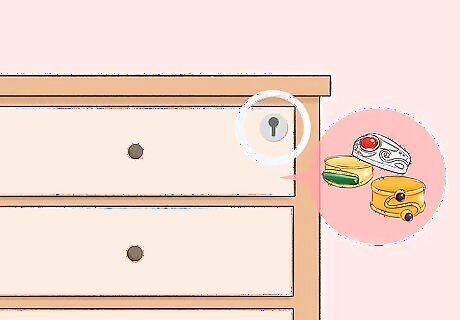
views
Dealing with the Problem at Home

Confront the person who takes your stuff. Usually, you can talk to a sibling or roommate in a more direct way when someone at school or work. Be polite and speak using nice language, but be assertive. Be reasonable and genuine when you share with them how you feel. If someone you live with eats a special snack you bought for yourself, you could smile (not a fake, sarcastic smile!) and say, "You know, I did buy that with my own money, and it’d be better if you could ask next time.” You could also try saying something like, “I was saving that popcorn for when I watch a movie tonight, and now there’s none left. Please don’t eat my stuff without asking, and if you do, please replace it.” If it’s a cosmetic product, you might say, “Hey, I’m a total germaphobe! I really don’t like sharing beauty products, so I’d really appreciate it if you wouldn’t use this.” When your sibling or roommate borrows an article of clothing without asking, you could explain to them that it makes you feel like you have no privacy when they go through your drawers or closet. Everyone has a right to their space!

Get a parent or adult involved. You might've already had a conversation with the person taking your stuff, but what if they keep doing it or get mad? You can get an adult to help settle the issue without being a tattle tale, especially when the problem is really hurting your relationship with the other person. If your sibling is the one taking your stuff, you can ask a parent to be there when you talk, to make sure no one gets upset and starts fighting. If your college roommate is the problem, resident assistants (RA) and/or director (RD) can help you out, especially if your roommate has taken something really valuable. Don't run to your RA or RD over something small, like a candy bar!

Get things you can share. When you and your roommate or sibling have a talk, you might decide on some things you both can share. Go halfsies on snacks you know you’ll both enjoy. Split the cost of a can of hairspray or leave-in conditioner if you know you’ll both need a go-to product to use in a rush. Make sure that you both clearly understand what’s community property and what’s for personal use.

Hide your stuff. If you’ve had a conversation with someone but the problem persists, you might have to hide your stuff. For example, if you've told your sister a thousand times that it bothers you when she wears your favorite necklace, don’t leave it on your dresser or out in the open. If you need something sweet after a tough day, but your roommate always robs your stash, hide your candy in a safe place. This works best if you’re pretty sure the person won’t go searching through your stuff. You don’t want encourage them to invade your privacy even more! Hiding something may be hard if you prefer having easy access to it. This method works best for special items of clothing or jewelry that you only wear every now and then.

Get a lock. Locking things up somewhere is a great alternative to hiding, especially if hiding something will only encourage someone you live with to go through your stuff. Since it's not always the most convenient, it’s best for things like valuable jewelry, special electronics, and other expensive stuff you really don't want others messing with. It might get even more annoying to have to unlock a safe or drawer for things you use often. Use your best judgment!
Stopping the Problem at School

Tell a teacher or trusted adult. Sometimes it could start a bigger problem if you just confront someone at school about taking your things without asking. It can be better to avoid an argument by someone older and wiser to get involved. If you have any doubts, it’s okay to go to a teacher or other trusted adult to make sure the problem gets solved fairly and without any fighting. If the person is your friend and it’s a little thing, just tell them that it hurts your feelings when they take from you. If it's someone you’re not so friendly with, it might be better to have a teacher mediate, or help solve, the problem.

Don’t hang around with people who steal. If someone has a reputation for using other people’s stuff without asking, avoid them! Remember, when someone takes something that doesn’t belong to them without permission, it’s called stealing. If you hang out with someone who steals, you might end up in trouble yourself.

Keep track of your things. Just like at home, if you don’t want someone using your stuff at school, you’d better keep it in a safe place. For example, don’t leave art supplies out if you don’t want to share them with the whole class. If you have a locker, keep important stuff there and keep it locked. Remember, even if you didn’t buy them yourself, books and school supplies can be very expensive. Be responsible, and don’t tempt people with your valuables by leaving them unattended.
Getting the Point Across at Work

Label your things. In a professional environment, sometimes you can’t run and find an adult. You are the adult! Likewise, you might not people able to confront a coworker like you would someone you share a home with, or your office environment might be so large that you can’t identify a specific culprit. Talk to someone face-to-face when possible and appropriate, and use labels when not. If someone routinely grabs your belongings for their own use, label your stuff. Have a personal desk fan? Grab a sharpie and write your name on its base. Try to make the label permanent when you can, so it’s not easily peeled off. This practice also works great to avoid confusion between an item you supplied and one the company provided. Make a clear distinction between communal property and what’s for your use only. Sometimes there is an honest confusion.

Leave a note. Everyone who brings a lunch to work has had a nibbler break into their goods. Leaving a note can seem futile, but it’s often worth the small effort. What’s more, when you combine it with some strategic friendliness, it can really pay off. Clearly mark food items left in a communal fridge or kitchen cupboard. Leave a note asking people to kindly keep from eating your food. Use nice, positive language. Every now and then, bring in an item for everyone. Leave it out with a note saying, “This is for the whole team!” When you do clearly mark what’s yours and yours alone, people will remember your generosity and respect your boundaries.

Determine when it’s a big deal. Sometimes people outright steal property willingly and repeatedly, or even take credit for work they didn’t do. Don’t overburden your boss with little things, but if a valuable has been stolen and you have evidence showing who the thief is, you might want to bring it to his or her attention. If that happens, or someone takes credit for your work and you feel you need to talk to a supervisor, do your best not to just complain and badmouth. Use the opportunity to show how you want to contribute to a safe, cooperative work environment.




















Comments
0 comment